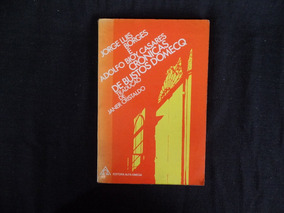

Leading this cast of key contemporary Argentinian authors, and preceding the country’s most famous twentieth-century writer, not to mention its greatest literary export, was his long-time collaborator, Adolfo Bioy Casares: presented alongside, rather than subsumed into, the Borgesian oeuvre and mythos (Figure 1).² (That said, its series cannot be accused of showing a political bias as it includes works such as Tomás Eloy Martínez’s La novela de Perón (1985 The Perón Novel) and Ricardo Piglia’s Respiración artificial (1980 Artificial Respiration).) What is most interesting is that when the ‘Biblioteca Argentina’ was announced by La Nación, it did so by producing a lengthy paean on the importance of the works selected to be volumes one and two in the series (both issued on 14 September 2001): Adolfo Bioy Casares’s Diario de la guerra del cerdo (1969 Diary of the War of the Pig) and Jorge Luis Borges’s El informe de Brodie (1970 Brodie’s Report) – ‘outstanding’ works by ‘two masters of the nation’s literature’. ¹ Although the public were unlikely to be investing or indulging in cultural products such as highbrow literary classics at a time of economic austerity and national emergency, it is possible to see here a conservative newspaper’s overwhelming desire to stoke feelings of cultural belonging and patriotic pride in the face of adversity. The aim was to reinvigorate the so-called Argentinian tradition of engaging with its own pioneering literary culture by making ‘works of significance’ accessible to all.

In September 2001, as Argentina came to a standstill amidst one of the worst economic crises in history, La Nación – the country’s only daily broadsheet – in association with Grupo Planeta – the largest publishing group in Latin America and Spain – came up with what was perhaps a rather characteristic display of cultural nationalism: it decided to launch its ‘Biblioteca Argentina’ (‘Argentinian library’), an elegantly presented collection of ‘affordable’ hardbacks comprising twenty-six iconic works of ‘contemporary’ national literature. Introduction Rethinking Adolfo Bioy Casares


 0 kommentar(er)
0 kommentar(er)
